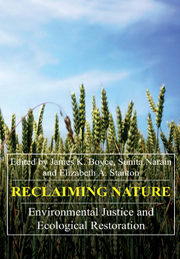Book contents
- Frontmatter
- Contents
- List of Figures and Tables
- Acknowledgements
- Introduction
- Part I ADDING VALUE
- Part II DEMOCRATIZING ACCESS
- Part III CAPTURING BENEFITS
- 9 Compensation for Environmental Services and Rural Communities: Lessons from the Americas
- 10 Certification Systems as Tools for Natural Asset Building
- 11 Wastes as Assets: Limits and Potentials
- 12 Community Rights and Wildlife Stewardship: Zimbabwe's CAMPFIRE Programme
- Part IV DEFENDING THE COMMONS
- About the Contributors
- Index
12 - Community Rights and Wildlife Stewardship: Zimbabwe's CAMPFIRE Programme
from Part III - CAPTURING BENEFITS
Published online by Cambridge University Press: 05 March 2012
- Frontmatter
- Contents
- List of Figures and Tables
- Acknowledgements
- Introduction
- Part I ADDING VALUE
- Part II DEMOCRATIZING ACCESS
- Part III CAPTURING BENEFITS
- 9 Compensation for Environmental Services and Rural Communities: Lessons from the Americas
- 10 Certification Systems as Tools for Natural Asset Building
- 11 Wastes as Assets: Limits and Potentials
- 12 Community Rights and Wildlife Stewardship: Zimbabwe's CAMPFIRE Programme
- Part IV DEFENDING THE COMMONS
- About the Contributors
- Index
Summary
Zimbabwe's Communal Areas Management Programme for Indigenous Resources (CAMPFIRE) is based on the idea that resource management problems are the result of the absence of both institutional capacity and incentives to manage resources sustainably. In 1989, the government introduced CAMPFIRE, a new system that assigns group ownership rights to communities and provides institutions for resource management for the benefit of these communities (Martin 1986). This was implemented through an amendment to the Parks and Wildlife Act of 1975 that enables the government to delegate ‘appropriate authority’ over wildlife to ‘communal representatives’.
The chapter explores whether CAMPFIRE has succeeded in devolving ownership over wildlife to communities and in generating benefits for these communities. I begin by evaluating the extent to which CAMPFIRE has achieved resource tenure reform by assigning clear and unambiguous rights to communities. I then seek to establish the extent to which benefits from wildlife management have become integrated into household livelihood strategies.
Communal Tenure
The CAMPFIRE programme is designed principally for the communal lands of Zimbabwe and aims to strengthen communal tenure regimes. Communal lands, formerly known as Reserves and later as Tribal Trust Lands, are areas that were designated for the African population of the country during the colonial era, alongside the expropriation of lands for the white settler community and subsequent policies aimed at creating labour reserves and undermining African agricultural livelihoods (Phimister 1986). There is considerable debate concerning the nature of the tenure system in the communal areas today.
- Type
- Chapter
- Information
- Reclaiming NatureEnvironmental Justice and Ecological Restoration, pp. 313 - 324Publisher: Anthem PressPrint publication year: 2007
- 1
- Cited by



